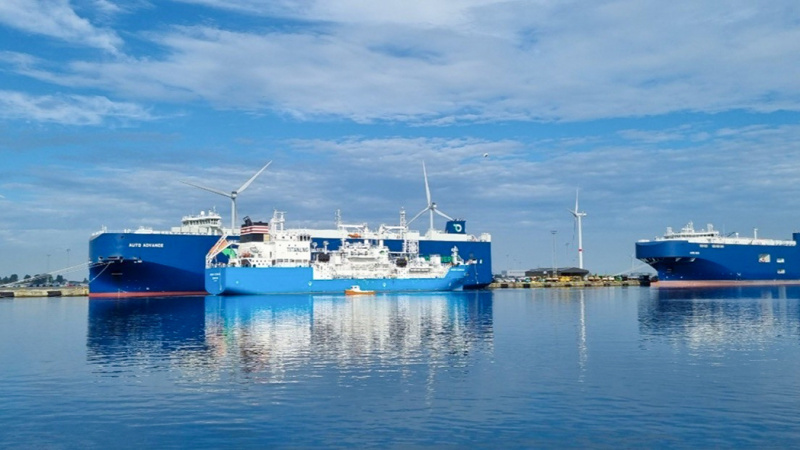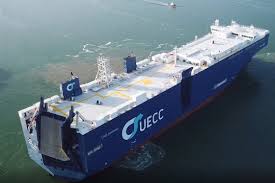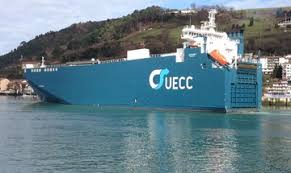Three European automakers, including Toyota Motor Europe and Ford of Europe, are turning to bioLNG (liquefied natural gas) fuel ships for vehicle transportation within Europe.
Three major automakers, including the European subsidiaries of Toyota Motor Corporation and Ford Motor Company, are adopting bioLNG-powered car carriers for finished vehicle transport across Europe. By using vessels that run on bioLNG, a low environmental impact fuel, these companies aim to reduce GHG (greenhouse gas) emissions throughout the entire supply chain of their finished vehicles.
Text by Hiro Yamamoto
Photo courtesy of UECC

United European Car Carriers (UECC), a Norway-based car carrier company in which Nippon Yusen Kabushiki Kaisha (NYK Line) holds a 50% stake, announced on September 9, 2024, that the European subsidiaries of Toyota Motor Corporation, Ford Motor Company, and other major European automakers have decided to join its “Sail for Change” programme.
The participation of the three automakers is expected to result in an annual emissions reduction of approximately 80,000 tons for UECC, which accounts for more than a third of UECC’s global Scope 1 emissions from vessel operations, estimated at around 220,000 tons. UECC operates a fleet of 16 car carriers with capacities ranging from 1,000 to 5,000 vehicles, providing maritime transport services within Europe. The fleet includes five LNG dual-fuel vessels that utilize bioLNG fuel.
Under the “Sail for Change” programme, UECC has conducted bunkering of ISCC-EU certified bioLNG (liquefied biomethane) for its five LNG dual-fuel and multi-fuel Pure Car and Truck Carriers (PCTC) at the Port of Zeebrugge through a previous agreement with Titan Clean Fuels.
As a result, UECC, a leading short-sea RoRo carrier in Europe, is executing carbon-neutral cargo operations across its entire port network. Customers will have access to verified emissions reduction data via a CO2 registry, enabling them to track emissions reductions throughout their entire supply chain thanks to the use of clean fuels.

■Benefits of Switching to Alternative Fuels
“Over the past decade, UECC has taken proactive steps to introduce alternative fuels into the industry, testing the use of biofuels and conducting bioLNG bunkering. This has been a significant step towards reducing our customers’ carbon footprint and increasing demand for low-carbon fuels,” explained Mr. Gent.
“Our goal with the ‘Sail for Change’ programme is to provide our customers with a single product that promotes the switch to sustainable fuels within our fleet, directly and immediately impacting their emissions.”
Furthermore, Mr. Gent noted that industry interest has exceeded UECC’s expectations, prompting an extension of the Green Gas Month initiative beyond July and consideration of expanding the programme to allow other companies to participate in the coming years.
“Our customers have ambitious decarbonization goals and understand that using alternative fuels can significantly reduce emissions from maritime transport. Additionally, using decarbonization services brings regulatory returns. As sustainable fuels are expected to become more economical in the future, our customers are keen to secure their supply now,” Mr. Gent elaborated.
Mr. Gent also pointed out that, in addition to minimizing emissions costs associated with the EU Emissions Trading System (ETS), supporting the use of alternative fuels can reduce costs that could otherwise be passed on to customers due to penalties imposed on shipping companies or the need to purchase compliance units under FuelEU Maritime regulations.
Thanks to its early investment in newbuild vessels powered by biofuels and LNG, UECC is well-prepared to exceed FuelEU regulations through the late 2030s, positioning itself on track to achieve net-zero operations by 2040.

■Supporting Sustainable Goals
Jean Christophe Deville, Vice President of Supply Chain at Toyota Motor Europe, stated, “Improving the sustainability of our logistics is a crucial step toward achieving our goal of becoming carbon neutral in Europe by 2040 and globally by 2050. UECC’s ‘Sail for Change’ programme represents a great opportunity to help realise this ambition.”
Glenn Edvardsen, CEO of UECC, concluded, “Sustainability has always been at the core of our business strategy, and we will continue to lead in adopting new alternative fuels aligned with greener operations for the benefit of the environment, our customers, and stakeholders.”
■About UECC
United European Car Carriers (UECC) is a company that provides sustainable short-sea RoRo transport in Europe. UECC focuses on delivering logistics solutions with an emphasis on sustainability and is committed to reducing environmental impact through the “Sail for Change” programme and other initiatives.

〆トヨタ自動車ヨーロッパ(Toyota Motor Europe),フォード・オブ・ヨーロッパ(Ford of Europe)など欧州自動車メーカー3社がUECCの「Sail for Change」を加速させる。
https://www.jmd.co.jp/article.php?no=299023
欧州自動車3社はバイオLNG(bioLNG)燃料船を自動車輸送に利用する
トヨタ自動車や米フォード・モーターの欧州法人など主要な自動車メーカー3社は、欧州域内の完成車輸送にバイオLNG(液化天然ガス)燃料自動車船を起用する。環境負荷の低いバイオLNGを燃料に使用する船舶を利用し、完成車のサプライチェーン全体からのGHG(温室効果ガス)排出削減を目指す。
(Text by Hiro Yamamoto)
Photo courtesy= UECC
日本郵船が50%出資する欧州域内自動車船社ユナイテッド・ヨーロピアン・カーキャリアーズ(UECC、ノルウェー)が2024年9月9日、同社が提供する「Sail for Change(セイル・フォー・チェンジ)」プログラムにトヨタとフォードの欧州法人、欧州の主要な自動車メーカーが参加することが決定したと発表した。
3社の自動車メーカーによるUECCの年間排出量削減効果は約8万トン、これは、船舶運航におけるUECCの全世界のスコープ1排出量約22万トンの3分の1以上と見込まれている。
UECCは1000―5000台積みの自動車船16隻を運航し、欧州域内で海上輸送サービスを提供している。LNG2元燃料船が5隻あり、それらでバイオLNG燃料を使用する。
